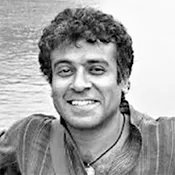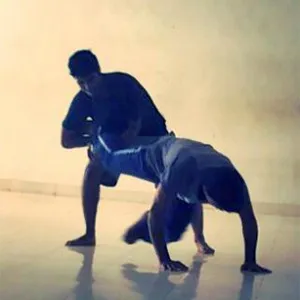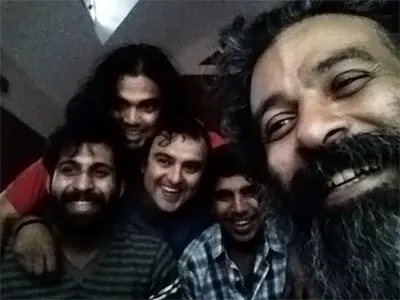‘When shit happens, move on’: yogi and martial art teacher Ashwin’s mantra for happiness
Ashwin Mohan is one of those people who could be any age. When I first saw him, I thought he was older than what he is; when I saw him teaching martial arts I felt he was younger than what he is. Truth is that he has probably always been the way he is, sort of ageless, and will always be that way. At the end of the day, this is not what his story is about.

Ashwin runs the yoga academy Adesa, manages Na Boli trust, a non-profit for cultural change, and has started Step Up, a training company for enhancing human potential. He appears to be a happy and healthy man. This wasn’t, however, how it started.
“I learned to fight because as a child I was bullied quite a bit,” he says. “When I was 11, I stood up to my bullies and ended up getting severely thrashed; I was bleeding and had the wind knocked out of me. But I was euphoric for the first time in my life because I followed through on my belief that I deserved respect.”
It was then that he met his first fighting mentor, who happened to be a hit man in hiding. “He taught me how to disable, disarm and even kill. Then he vanished mysteriously after taking money from all my friends,” Ashwin recounts.
“I still use one of the techniques he taught me. He used to say, “You can’t hit what you can’t see,” then he would spit in my eyes and beat me up.” The most empowering thing Ashwin learnt from his mentor was the benefit of following one's animal instinct. He learnt that if you respect your brain’s ability to solve problems you will never be insecure.
The entrepreneur
Ashwin started teaching martial arts when he was 11 because he earned his black belt and his teacher wanted to expand his classes. “Since then, I’ve been an entrepreneur,” he says.
When Ashwin was 13 he started selling UPS machines; in his last years of college he set up an event management company, which later became a corporate training company focussed on organizational development and communication skills. The most interesting aspect of Ashwin’s career is not only what he did, but the rationale behind it.
“Every setup I have now is by verbal agreement; I detest contracts because it assumes one of us is stupid enough to cheat the other.” You may agree or disagree with his words, thinking he is being naïve; or brave. But the most remarkable thing is that Ashwin sticks to them.
He helps friends who are also entrepreneurs to fix the culture of their company and maximise their productivity. He has created a self-defence module that was adopted by the 200, 000 souls Sri Lankan refugee community in India. “They changed the rape culture prevailing in their environment within two years,” he explains, adding that he is currently attempting to scale up the same model so any community anywhere in the world can use this know-how for free (check www.naboli.org for more information). Moreover, he has collaborated with the central government to develop a self-defence program that his team has implemented in schools all over India, reaching six million girls.

“The only resource I have always depended on is my ability to think clearly and creatively and communicate with affection and warmth while keeping it relevant and focussed. You don’t really need much else to run a company,” he says.
The teacher
According to Ashwin, there are a couple of things one should know about martial arts.
The first is that fighting is what ignorant and insecure people do when they cannot think of better resources or when their ego or self image is disregarded or threatened. It’s completely useless. A good fighter or a warrior just communicates ample threat.
Second, the interest in martial arts goes up and down according to movies hitting the theatres. Ashwin says that after the movie Mary Kom was released he got a lot of phone calls from young girls who wanted to start boxing classes. “I asked them to call me back after a week if they were still enthusiastic, but nobody did.”
Ashwin explains that those who are interested in martial arts either want the sexy and glamorous body of a martial artist, or aim to learn self-defence. The latter – outnumbered by the former - are mostly people who got ‘policed’ by some moral police or mugged by criminals and cannot count on support from family or friends.
Ashwin’s teachings have reached millions, but he says numbers are only generic indicators. “I currently have more students seeking happiness than self defence or martial arts. Students chose what they want to learn, not teachers.”

The learner
Ashwin's teacher was from the Nath order and authority. He taught him how to develop the three powers - the power to unequivocally know what you want (ichha shakti), the power to build a strategy to achieve it (jnana shakti), and the power to implement the strategy (kriya shakti).
“My Nath teacher took no money from me but as his guru dakshina he wanted me to teach the Nath tradition in simple English and make it accessible to a worldwide audience. This is what I’m currently doing,” he says.
Ashwin says that teaching itself is education for him. The relationship with his students has taught him patience, respect, love and communication, while the bond with his team keeps him going. “My main challenge has always been my own stupidity and insecurity, but it has considerably reduced over the years. I have an excellent team who will kick my butt if I slip.”

Ashwin grabs like a lion, kicks like a horse, whirls his spine like a snake, and fights half like a combination of these animals, half like Bob Marley singing Don't rock my boat. Moreover, he introduces himself as a yogi from the Nath order. A peculiar and powerful mix. Yet, he brings himself around like a very normal man working towards self-improvement and happiness. It comes as no surprise when he says that the mantra his teacher gave him is, “Om malam gataha akalikam prachalati” the Sanskrit for: “Om shit happens; immediately move on.”







